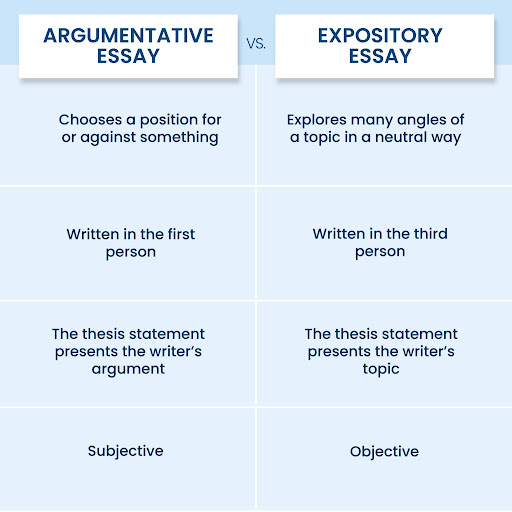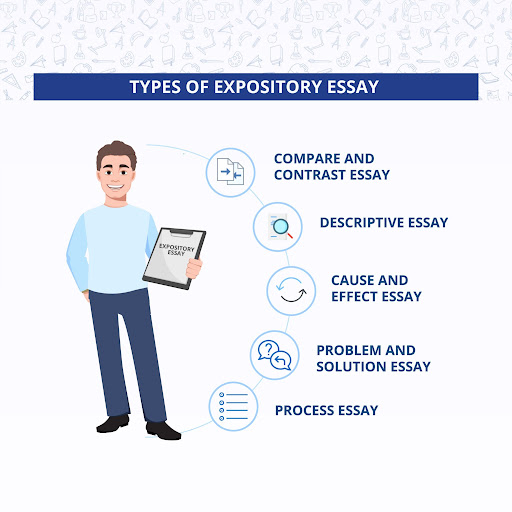Expository Essay Definition
'What is an expository essay?'
An expository essay is one of the most challenging writing assignments that need dedication and understanding.
The term expository comes from the word “expose.” It means explaining and clarifying something in great detail. In this type of essay, a specific topic is researched and then explained. All claims in this kind of an essay must be backed with solid proof.
In this type of essay, a specific topic is researched and then explained. All claims in this kind of essay must be backed with solid proof.
‘What is the purpose of an expository essay?’
The main purpose of an expository essay is to:
- Expose a particular topic.
- Investigate a topic to increase your understanding as well as the readers.
- Present an objective description of the topic.
Moreover, an expository essay is an informational, conceptual essay that has a single point of view to support it. This type of essay usually involves illustration and explanation to make the main idea clear while also providing useful facts for readers with little knowledge on the topic.
Expository Essay Vs. Argumentative Essay

Types of Expository Essay
Expository essays are further categorized into five different types. Here are the five types of expository essay that are commonly used:

Let us discuss these types in detail.
1. Compare and Contrast Essay
A compare or contrast essay involves looking at two objects or ideas and analyzing them based on their similarities or differences. Keep in mind that the two objects or subjects under comparison must belong to the same category.
For instance, you can compare and contrast Batman and Superman but not Batman vs. Aristotle.
2. Descriptive Essay
In a descriptive essay, you must provide a detailed explanation of an object, event, or person. This type of essay provides the writer with room for creative freedom. You have a variety of topics to choose from and work from in descriptive essays. The writers are supposed to use sensory information to help the reader visualize the text using their five senses.
3. Cause and Effect Essay
Cause and effect essays require an analysis of an object or process. It requires digging a little deeper and figuring out why an event occurred and its effects.
The analysis is the most crucial aspect of writing a cause-and-effect essay and requires critical thinking skills and strong writing skills.
This type of essay examines the impact of other people or events on something in the world.
4. Problem and Solution Essay
In this type of expository essay, problems are identified, stated, and possible solutions are discussed. You must shed light on a problem and propose a valid solution for it.
5. Process Essay
A process essay is a step-by-step guide to completing some type of task. It tells readers how to do things and often provides instructions on how to accomplish a certain task in detail with clarity and precision.
How to Start an Expository essay?
Before you start, you may need to follow some steps that help you in writing a successful essay. Here are some steps to follow.
1. Choose a Topic
To start an expository essay, choose a brilliant topic to write on first.
For choosing the perfect topic, brainstorm different ideas that interest you and create an extensive list. Then, select the topic that interests and inspires you and start your research. Note that it is equally important to keep your reader’s preference in mind as well.
2. Create a Thesis Statement
The most important component of an expository essay is to focus on the thesis statement. A thesis statement indicates the main point of the essay and what will be discussed further in it. Write the good thesis statement in one or two lines towards the end of the introduction, followed by the body.
3. Create the Outline
Create an expository essay outline by mentioning every main point that is going to be discussed in each paragraph. Keep your outline organized and structured.
How to Create an Expository Essay Outline?
Your outline should act as a blueprint to guide you through the process of building your essay. Without it, there's more risk that we stray off-topic or get confused due to all these new ideas coming in with no clear place for them.
Here is a sample expository essay outline.
Introduction
- Hook Statement
- Background Details
- Thesis Statement
Main Body Section
- 1st Paragraph - Topic sentence, details, conclusion.
- 2nd Paragraph - Topic sentence, details, conclusion.
- 3rd Paragraph - Topic sentence, details, conclusion.
Conclusion
- Summary of the thesis statement.
- Discussion of important points.
- Call to action.
A detailed guide about expository essay outline will help you learn more about it and write your essay easily and in less time.
How to Write an Expository Essay?
Here are some steps that you should follow and create a well-written expository essay.
1. Write the Introduction
When writing the introductory paragraph, remember that there are the following purposes:
- Grab the reader’s attention.
- Define the essay topic
- State the main idea/purpose of the essay.
A hook statement is used to attract the reader’s attention and engage them. It is written using different ways such as quotations, anecdotes, statistics, rhetorical questions, personal stories, etc.
After the hook statement, present necessary information about the topic to clear any ambiguities. And lastly, end this section by stating your thesis.
2. Write the Body Paragraphs
The body is where you will discuss and define your topic. Present information about the topic logically, prioritize different points based on importance. Also, provide supporting facts and evidence and explain their significance.
3. Write the Conclusion
The last section of your essay is the concluding paragraph. Brush up on all the main points without repeating them. Highlight the significance of your topic and provide a solution if you addressed an issue.
Establish a strong connection between these parts to make a solid structure. Ensure you fulfill all the requirements necessary for the writing process of the expository essay and follow your instructor’s guidelines.
4. Revise your Essay
Once you have completed writing your essay, revise it thoroughly. Also, keep the following points in your mind while you are checking your essay.
- Is your essay written with an unbiased analysis?
- Are the facts and examples relevant to the topic of the essay?
- Is the information written and communicated to the readers?
- Are there any unnecessary details included in the essay?
- Is the entire content of the essay focused on the topic?
- Are there strong transition words being used in the body paragraphs?
- Is there a smooth flow between the body paragraphs?
- Is the conclusion correlating with the supporting details mentioned in the essay?
If your essay is written according to these parameters, then you can easily move to the next step, proofreading.
5. Proofreading and Editing
Now you are almost done with your essay. Don’t forget to proofread your essay before you submit it.
No matter how strong and detailed content you have added in your essay. If there are grammatical mistakes in it, the whole rhythm of your essay will be ruined.
Expository Essay Topics
Below is a list of unique expository writing prompts that can help you to grab top grades from your professor.
- Discuss the strong point of view of your character.
- What are your suggestions on time management?
- Explain why aliens are real.
- What are the drawbacks of having a curfew?
- Explain the concept of love.
- Explain the time that you have been really happy.
- How is being fat different from being overweight?
- Do teachers truly care for students?
- Is there a connection between boredom and hunger?
- Can reading in the dark lead to blindness?
Other than these, you can check numerous other expository essay topics to get an idea about the kind of topics that work best for such essays.
Expository Essay Examples
If you still feel that more guidance is needed, check out these examples of expository essays to get a clearer picture.
Tips for Writing the Expository Essay
To write an excellent essay, you need to keep in mind the following tips:
- Understand your topic, learn about it as much as you can
- Go through similar expository essay samples.
- Look for supporting evidence.
- Develop an outline.
- Come up with a writing style.
- Create the rough draft.
- Edit and update.
- Start each body paragraph of the essay with a topic sentence.
- Write the final version.
Some writers may continue to struggle in their writing endeavors even after reading and following our paper writing guidelines.
Worry not! Simply get in touch with our essay writing company.
A little help from our team of experienced academic writers can help you achieve top grades. In addition, our team of professional essay writers has years of experience in producing a variety of quality essays.
Order essay online now and get high-quality assistance from professionals!










